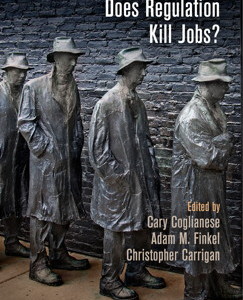Regulatory Policy
Jobs & Regs
The empirical evidence suggests that job loss from regulation is small.
It seems to be easy to make arguments one way or another about the effect of regulation on jobs. What does the evidence say? Those seeking an answer would do well to look at a recent book on the subject by Coglianese, Finkel, and Carrigan. Although the book is broader in scope, it provides a careful …
Continue reading “Jobs & Regs”
CONTINUE READINGRequiem for a Bottom-Feeder
UCLA’s Don Shoup Has Transformed Urban Planning
Every scholar wants to do good, productive, important work, but I suppose all us secretly would like to redefine our fields — to go down in academic history, so to speak. Virtually none of us do. But UCLA’s Don Shoup, who is retiring this year from the Urban Planning department, is one who has. And …
Continue reading “Requiem for a Bottom-Feeder”
CONTINUE READINGThe Battle to Restore Hetch Hetchy Valley Moves to the Courts
New Lawsuit Claims Dam and Reservoir in Yosemite National Park Violate California Constitution
This week, the longstanding battle over the dam and reservoir that have for a century flooded Yosemite National Park’s storied Hetch Hetchy Valley moves to the courts. A new lawsuit, filed by conservationists on the 177th anniversary of John Muir’s birth, asserts that the City of San Francisco’s continued operation of O’Shaughnessy Dam and Hetch Hetchy Reservoir …
Continue reading “The Battle to Restore Hetch Hetchy Valley Moves to the Courts”
CONTINUE READINGCarbon Vouchers: A Small-Government Approach to Climate Action
How to limit climate change without giving the Feds enforcement powers or revenue.
What I’m going to sketch here isn’t a zero government approach. But the government’s role is very limited: federal agencies don’t do any enforcement and the government doesn’t touch any revenue from the scheme. So this approach deals with the concern that a carbon tax or something similar would either expand EPA’s ability to abuse …
Continue reading “Carbon Vouchers: A Small-Government Approach to Climate Action”
CONTINUE READINGHas EPA’s Proposed NSPS Expired?
Responding to claims that EPA must withdraw its proposed rules to control power-plant GHGs under CAA § 111
Challenges to EPA’s emergent program to regulate greenhouse gas (GHG) emissions under Clean Air Act section 111 continue to mount. Recently, the Attorneys General of 19 states sent a joint letter to EPA arguing that because EPA failed to finalize its proposed New Source Performance Standard (NSPS) for GHG emissions within one year—as the Clean …
Continue reading “Has EPA’s Proposed NSPS Expired?”
CONTINUE READINGThe Grid is Always Greener …
New York electricity regulators are working hard on “Reforming the Energy Vision”
It seems to be an undeniable part of human nature. When we consider making changes – whether it has to do with the place where we live, the business we are in, or the partner we choose – we tend to compare the flaws of the thing we know to the ideal version of the …
Continue reading “The Grid is Always Greener …”
CONTINUE READINGThe Unreasonable Risk of TSCA Reform
Caught Between a Rock and a Hard Place
The Frank R. Lautenberg Chemical Safety for the 21st Century Act is no doubt generating significant conflict, including claims of undue industry influence, competing bills from prominent members of the same party, consternation among states, and divisions among health and environmental groups. And it may also be the closest we have gotten to TSCA reform—ever. …
Continue reading “The Unreasonable Risk of TSCA Reform”
CONTINUE READINGCalifornia Supreme Court to Decide Major CEQA, Climate Change Case
Justices’ Latest Grant of Review Continues Supreme Court’s Focus on Environmental Law
To paraphrase former President Ronald Reagan, there they go again. The California Supreme Court on Wednesday granted review in an important case at the intersection of the California Environmental Quality Act (CEQA) and one of the state’s most important climate change laws. The case, Cleveland National Forest Foundation v. San Diego Association of Governments, is the …
Continue reading “California Supreme Court to Decide Major CEQA, Climate Change Case”
CONTINUE READINGTSCA Reform: That’s A Good Thing, Right?
Reform of the federal chemicals statute, the Toxic Substances Control Act (TSCA), is in the news again. It got me wondering, are we are better off with the devil we know? In a legislative era characterized by harsh partisanship and excruciating deadlocks, there are signs that TSCA reform could be a rare example of cooperation …
Continue reading “TSCA Reform: That’s A Good Thing, Right?”
CONTINUE READINGEcon101, Ideological Blinders, and the New Head of CBO
There are troubling indications that Keith Hall lets ideology blind him to basic economics.
Last week, in a post about the employment effect of regulations, I mentioned briefly that the new Director of the Congressional Budget Office, Keith Hall, had endorsed some questionable views on the subject. A reader pointed me toward an additional writing that has done a lot to escalate my concerns. There are disturbing signs about both Hall’s ideological bias …
Continue reading “Econ101, Ideological Blinders, and the New Head of CBO”
CONTINUE READING









